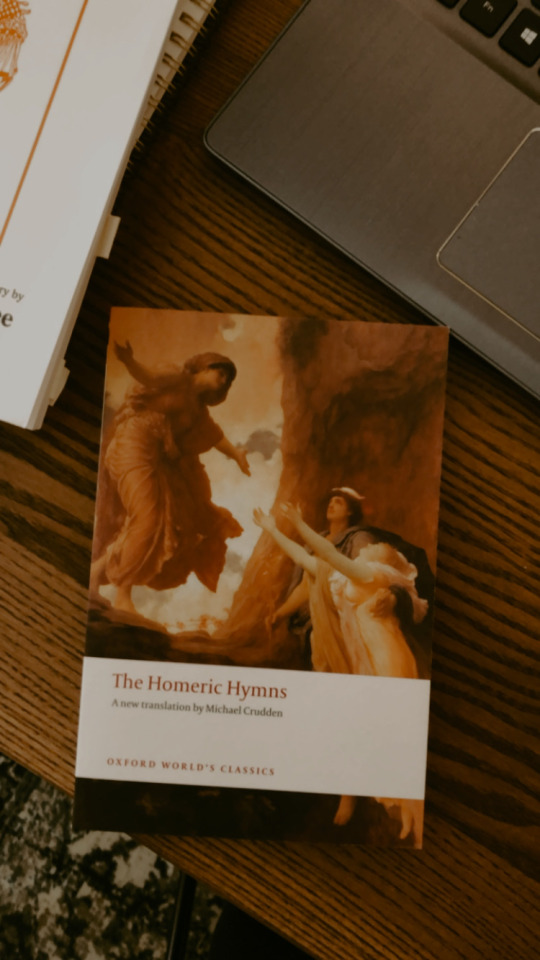#homeric hymns
So, I wanna point out a thing. In the Homeric Hymn to Demeter, there’s a line that says the following:
“Then Hekatê approached them, the one with the splendid headband. And she welcomed back the daughter of holy Demeter with many embraces. And from that day forward, the Lady [Hekatê] became her [Persephone’s] attendant and substitute queen.” (438-40)
The phrase I bolded suggests that Hekate assumes Persephone’s roles as Queen of the Underworld when Persephone is with Demeter. While we already know Hekate has power over the dead and is a goddess of the Underworld in Her own right, it seems that She may actually rule beside Hades while Persephone is away.
This is just really interesting to me, that Hades and Hekate may have a platonic monarchical relationship over the Underworld at times. Also, this illustrates that Hekate’s role over the dead may be far earlier in origin than many people give credit for. It’s just a small quote and piece of info, but I think it’s nifty.
I’m very sorry I have to correct this, but this interpretation is based on an inaccurate translation. The Greek text reads:
τῆισιν δ᾿ ἐγγύθεν ἦλθ᾿ Ἑκάτη λιπαροκρήδεμνος,
πολλὰ δ᾿ ἄρ᾿ ἀμφαγάπησε κόρην Δημήτερος ἁγνῆς·
ἐκ τοῦ οἱ πρόπολος καὶ ὀπάων ἔπλετ᾿ ἄνασσα.
I can only assume what was translated as “substitute queen” is ὀπάων ἔπλετ᾿ ἄνασσα. The actual translation, however, should be “the queen (Hekate) became (Persephone’s) companion”. Ὀπάων, from the verb ὀπάζω “to follow”, refers to a comrade or attendant; “substitute” is nowhere near the realm of its meanings, and I have no idea where the above translation got it from. [EDIT: I found the source and it’s Gregory Nagy’s translation. Still have no idea how he came up with that though.]
Other online translations of the hymn give its correct meaning, e.g. Theoi has “from that time the lady Hecate was minister and companion to Persephone”.
Still, the actual translation doesn’t entirely disassociate Hekate from the Underworld. By becoming Persephone’s attendant, Hekate takes on a role in her cult, and may well have acquired some chthonic aspects from that.

Who was this mythical storyteller? A singing bard-poet, (aoidoi)-dramatically orating the epic tales for aristocratic banquets or bawdy taverns? A collective of poets-refining their work over generations? The unfortunate truth is, we just don’t know.
Homer is thought to have existed around 800-700 B.C. and is credited as the creator and poet of the epics; “The Iliad” (15,693 lines) and “The Odyssey” (12,109 lines). Homer existed during a time when Linear B had been lost, or the Greek “dark ages.” So the poets of this time sung their tales in song-like structures, passing the oral art form down form generation to generation. Therefore, its unlikely Homer made up these tales, but inherited and refined them from older tales that had been passed down in the oral tradition. To complicate things further, Between the epics, there are variations in narrative style, vocabulary, and geographic expertise, which lead many scholars speculate that The Iliad and Odyssey were written by different authors.
Unfortunately, there are no biographical details within the epics to give us insight into the author(s). However, In the Odyssey, there is a blind bard poet character, Demodocus, who recites his poetry to the royal court. Some have suggested that this character was created by Homer as a reflection of himself. This is a fun and tempting parallel to draw. Similar to how we might get the reflection of Shakespeare’s voice through Hamlet when the prince describes to his players the the philosophies of theatre acting. The portrayal of a blind poet also creates a nice symbolic parallel to the Norse God Odin, who, sacrificed an eye in exchange for divine wisdom. Indeed, the Greek bards saw themselves as divinely inspired by “the Muses”; the inspirational goddesses of the creative arts. Through Homer, the elegant oral form crafted these classics, and, incredibly, we can still hear the song like syntax and repetitions in the texts.


16th April 2022
some (slightly) unexpected places the phd has taken me today

